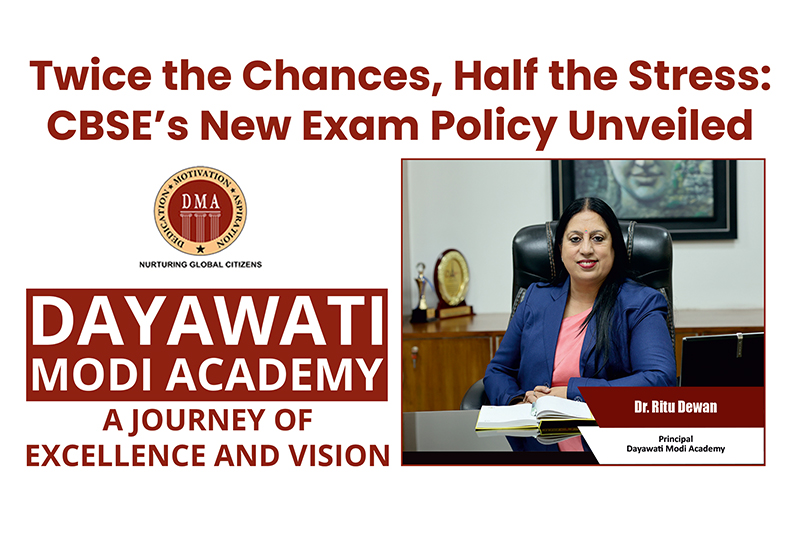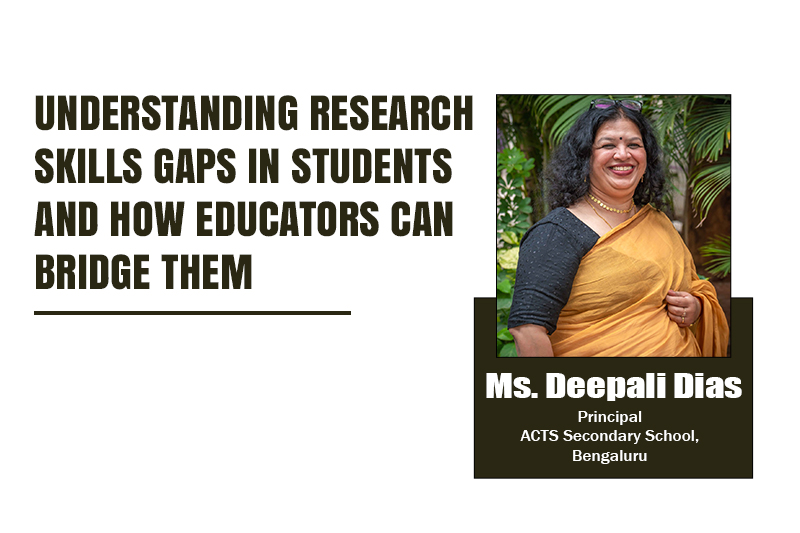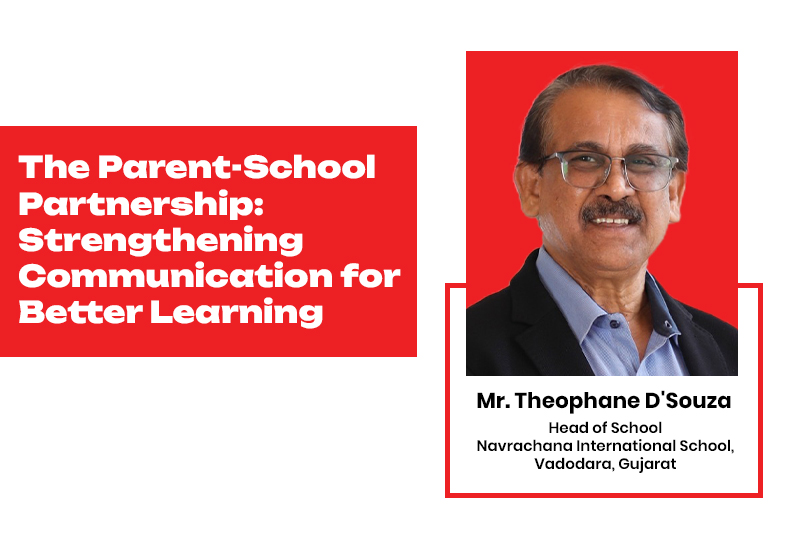Ritu Dewan, Dayawati Modi Academy, Welcomes CBSE Two-Exam Policy 2026
Twice the Chances, Half the Stress: CBSE’s Bold New Exam Policy
For decades, Class 10 board exams under the Central Board of Secondary Education (CBSE) have been viewed as a high-stakes milestone in every Indian student’s academic journey. With just one annual exam deciding a student’s future opportunities, the system has often been criticized for fostering extreme stress, dependence on coaching centres, and rigid academic structures.Recognizing the urgent need for reform, CBSE has introduced a groundbreaking new policy starting from the 2026 academic session—Class 10 students will now be able to appear for board exams twice a year. This progressive change, aligned with the National Education Policy (NEP) 2020, is designed to ease stress, provide flexibility, and encourage continuous growth in learning.
Dayawati Modi Academy, Meerut, is among the many schools welcoming this reform. Ritu Dewan, representing the institution, strongly supports this policy, highlighting how it resonates with the school’s philosophy of holistic and student-centric education.
Why the New Policy Matters
Until now, students had only one chance each year to prove themselves. A single exam dictated their marks, confidence, and mental well-being. The fear of failure and the social stigma of underperformance created a cycle of anxiety and overdependence on rote learning.With the new two-exam format, students can attempt the exams twice, scheduled for mid-February and May. If they perform well on the first attempt, they can focus on other goals. If not, they can use the second attempt to improve their scores.
This reform is not just about scheduling flexibility but redefining how India approaches examinations.
Dayawati Modi Academy’s Perspective
At Dayawati Modi Academy (DMA), Meerut, the philosophy of education has always gone beyond marksheets and rankings. As Ritu Dewan notes, the school fosters resilient, confident, and creative learners who engage deeply with knowledge rather than chase grades.Welcoming CBSE’s initiative, Dewan emphasized that the two-exam system directly supports student well-being, offering learners a fair chance to succeed without fear. “This forward-thinking reform echoes our long-standing vision,” she said. “It empowers students to learn meaningfully, free from the shadow of unhealthy competition.”
Key Advantages of the Two-Exam Policy
1. Reduced Exam Pressure
The new system eliminates the burden of one high-stakes exam. With two opportunities, students can approach exams less anxiously, knowing their future does not depend on a single performance.2. Flexibility to Improve Scores
Students who struggle in up to three subjects can reappear in the second session. Only the best score is recorded, ensuring students are rewarded for persistence and continuous effort.3. Less Dependence on Coaching Centres
With two attempts available, the pressure to enroll in aggressive coaching programs diminishes. Instead, students can focus on conceptual clarity and authentic learning, moving away from rote memorization.4. Inclusive Provisions for Diverse Needs
The policy also accommodates sportspersons, students from winter-bound schools, and children with special needs, allowing them to choose the exam session that fits their circumstances. This inclusivity strengthens India’s move toward equitable education.5. Fairer Assessment System
By considering only the higher score out of the two attempts, CBSE ensures students are evaluated at their best, not under pressure. This fairer system boosts self-confidence and motivates consistent learning.6. Encouragement of a Growth Mindset
Exams are no longer a one-shot test of memory but part of a learning journey. Students will begin to see assessments as opportunities for improvement, not as final verdicts.7. Alignment with NEP 2020 Goals
The policy aligns seamlessly with NEP 2020’s vision of reducing exam-centric pressures, promoting inclusivity, and focusing on student-centric learning. It marks a significant step toward reimagining India’s education system for the 21st century.A Transformative Step for Student Well-Being
Research has consistently shown that exam stress is one of the most significant contributors to anxiety and depression among Indian students. The pressure to perform and societal expectations often overshadow creativity, curiosity, and the joy of learning.With this reform, CBSE has taken a student-first approach, recognizing the need to safeguard mental health while ensuring academic rigor. Dayawati Modi Academy’s educators strongly believe that when students are free from crippling anxiety, they perform not only better in exams but also grow into more confident and capable individuals.
The School’s Commitment to Supporting the Reform
Dayawati Modi Academy has already been practicing an education model that aligns with the spirit of this reform. Through innovative teaching methods, emphasis on experiential learning, and continuous mentoring, the school ensures that students do not view exams as an end in themselves.As Dewan noted, the academy is committed to supporting students navigating this new system. Teachers will actively guide students through the two-exam approach, helping them plan revisions strategically and encouraging a healthier outlook toward academic success.
The Bigger Picture: Changing India’s Exam Culture
The CBSE Two-Exam Policy 2026 is not just about Class 10—it signals a broader shift in India’s education ecosystem. By normalizing the idea that students deserve second chances and redefining exams as tools for growth, CBSE is actively working toward dismantling the culture of fear surrounding board exams.This policy could inspire future reforms, such as competency-based assessments, flexible learning pathways, and greater integration of skills-based learning in schools across India.
Conclusion
The CBSE Two-Exam Policy 2026 is a historic reform that has the potential to reshape how students, parents, and educators perceive exams in India. It places student well-being at the center of assessment, ensuring exams empower rather than intimidate.At Dayawati Modi Academy, Meerut, Ritu Dewan and the school community have welcomed this policy wholeheartedly. For them, the change is not just about exams—it is about creating a balanced, inclusive, and enriching academic journey for every learner.
As India’s education landscape evolves, this reform promises a future where students are not judged by a single moment but celebrated for their continuous progress, resilience, and potential.






